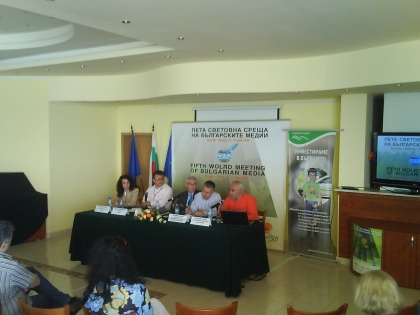
Ivan Petkov
GRReporter correspondent in Varna
Not long ago ended the Fifth global meeting of the Bulgarian media, which was broadly covered and analyzed by the media. Following, I will present you my entirely subjective view of the media forum, because of three reasons.
First, because the feeling I was left with is not from any official or formal meeting but from communicating of people with people, exchanging opinions, ideas and experience.
Second, in one of the many discussions there, one of my interlocutors had the opinion that in the following years, the media will go under a severe development (especially the online media) and it will combine the traditional informational characteristic with the personal experience and the social element of communicating. More interaction!
Third, due to its broad media attention, including during the meeting itself, I do not want this to be just one more article on this topic. The way people interact has changed and this is thanks to few popular social networks and blogs. This is why, it is my desire this article to try and present a more subjective view of the event and in particular the social experiment. Yes dear reader, the following years will be ones of very interesting online social experiments. They will be done on the try-fail basis and this way a new way of communicating will be developed and the traditional idea of a “media” and “news” will be changed. The Bulgarian media will actively participate, or at least I can promise this about GRReporter.
So, it seems that I have started with my conclusions from the meeting. But those conclusions are needed, in order for the stressed subjective part of this article to be understood. I hope you will enjoy it. And so – full ahead, because the luck smiles to the brave ones!
During the 40-minute flight from Sofia to Varna, where I was going join the second part of the meeting, I was thinking over my impressions by the official opening in the ceremonial hall in the University of Sofia and my expectations from the program and the participants… In my ears tingled the deep voice of Krishna Das, the popular performer of Indian kirtans, which together with the view reminded me how fleeting and insignificant some of our worries, actions and problems are.
The first day of the meeting started with two topics of discussion, which I briefly discussed in the article “The future of the media is internet and digital TV”. Here are some interesting comments, by the participants of the discussions:
· The Romanian community in Spain is the biggest foreign community – nearly 750 thousand. Romania takes care of them – direct investments in supporting the Romanian press abroad. The Bulgarian media abroad does not receive any financial help.
· About 80% of the state laws, approved and ratified by the national parliaments, are prepared in the European parliament. This obvious reference to the upcoming Euro-parliament elections hinted the growing integration on the Old continent – a process, which can easily be aided by the online media, because the internet does not have any limitations and technology can overcome language barriers.
· The advertising market, which based on unofficial data is about BGN 200-250 million (?102-?128 million), will shrink with almost 50% for the current year. The crisis affects advertising in the traditional media – newspapers and TV, and the low-cost media, like the one online is growing.
· There are newspapers, which do not carry a print format but are entirely electronic – Chicago Tribune and Los Angeles Times.
· Some of the Bulgarian media abroad shared its positive experience from the financial crisis – growing advertising income. This is based on a good market approach and optimized expenses.
· Analog TV in Bulgaria needs to be digitalized on two stages – a realistic deadline is 2015. Even technology giants like the ones in the US and Japan are falling back.
· Each one of the big and known TV stations like Kanal1, BTV, and Nova TV will have the right to have 8 digital programs, at the expense of 1 analog, which is being broadcasted right now. The logical questions are two and are more or less rhetorical with an answer “NO”:
1. Will the TV station be able to produce material, which will fill up 8 TV channels?
2. Will the national advertising market be able to “feed” so many programs?
· The digital TV in Bulgaria will use the MPEG-4 format, which is more expensive but a better quality.
· The biggest part of Bulgarian households is using the services of the cable TV operators. A strong competition is expected among them and the digital TV, which is about to be introduced.
The organizers surprised us with an unexpected visit to Evxinograd, where we were able to take a look at the gardens, visit the palace and try the famous wine from the city.
During the first day of the meeting, Laura Kirilova Chukanov (Miss Utah) was present and I had the opportunity to talk to her briefly. Especially for our readers I got my picture taken with her.